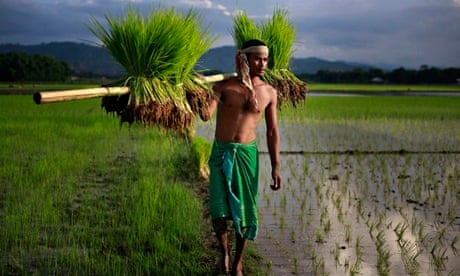The idea of “development” can still conjure up romantic visions among some about helping to improve the lives of people in the “third world” through sheer goodwill. Yet we hold on to the term and defend it.
We also hold on to the UK’s Department for International Development or the millennium development goals or, indeed, Guardian global development like an uncle: worthy and charming, if occasionally drunk at inappropriate moments, that, as a family, we hastily brush under the carpet and hope nobody notices.
But for many working in the sector, the term that is used to describe our work provokes reactions ranging from a mild cringe to pure antagonism. A recent animated video from Survival International perfectly describes what’s wrong with development. It has for years been peppered with misguided projects that failed poor people. Phrases such as “sustainable development” have done little to improve the status quo.
Does language matter? I think it does. George Lakoff, who advised US president Barack Obama in the runup to his initial election, wrote a book called Don’t Think of an Elephant. It describes how important language is to the way people engage and where policy can lead based on the language used to describe it. His most notable example is the use of “tax relief”, a term which implies that tax is something we need relief from, rather than investment in common services. The NGO sector’s 2011 Finding Frames (pdf) report acknowledges public disengagement with “development” but fails to reject the phrase that may actually be separating us from solutions.
Development as a term is no longer appropriate – unless you’re a property developer, an IT developer or a fundraiser.
Many developing countries are not necessarily poor, though they may have large numbers of poor people. They may have a wealth of resources, either in the form of mineral, agricultural or human capital, but suffer from policies that have been imposed on them, or poorly implemented. There was much outrage a few years ago when India launched a space programme and an overseas aid agency, even though it has the highest number of absolute poor people in the world.
Describing a country as developing leads to the use of simplistic primary indicators by which we measure success and, in turn, simplistic solutions. We know that per capita income and GDP are almost useless indicators of poverty reduction. They fail to measure income inequality or provision of universal public services. Such indicators also assume, as implied by the Survival video, that boosting income is the only way to reduce poverty.
The first millennium development goal, to halve the proportion of people living on less than $1.25 (75p) per day, is a case in point. Achievement of this indicator may not prevent a loss of livelihood or an inability to live with dignity. It could just as easily lead to more marketised solutions to providing healthcare, water or education, meaning that earning $1.25 a day can still leave people in abject poverty.
Employment may not be the solution for everyone. A poor farmer in India doesn’t need development in the form of a job as a labourer in return for his land. Instead, he needs availability of seeds, mitigation from climate change and services for his children. Similarly, a woman working the same land needs land titles.
We have shied away from being bolder about what many in development know to be the real solutions: stronger rights and accountable governments. The recent global backlash against campaigning and rights-based organisations has only further served to send some back to the comfort zone of traditional development. It inevitably means they shy away from campaigning and solidarity-based activity.
So if not development then what? Some organisations have eschewed the word. “Pro-poor” is often used in its place, but makes it sound as though we’re in favour of poverty. Anti-poverty isn’t a very tidy phrase, but it sums things up to a point. However, just being “anti” something doesn’t say what you stand for. Unfortunately, the opposite of “anti-poor” would be “pro-wealth', which wouldn’t suffice either.
Some have adopted the phrase “the global south” instead of “developing countries”. However, this fails to recognise that some countries in eastern Europe may be poorer than southern countries. It also ignores the poverty in specific regions of southern countries – not every part of India, Nigeria, Brazil or Indonesia can be classed as poor. Within most countries, north or south, poor people might have more in common with the poor in other countries, rather than their own. While there might be cases of extreme poverty in more southern countries, the concept of a “global south” creates an unnecessary conflict that masks a different reality.
Words such as “power” and “wellbeing” are important, and avoid the misgivings associated with development. Clearly we’re not a “power” sector – that’s for the energy industry. And “wellbeing” would lead to most of the public seeing us an adjunct to the healthcare sector.
Perhaps we don’t need a word for our sector at all. Many who work in areas focusing on global poverty should call themselves just that; global poverty NGOs; for organisations that focus more on rights, call yourself a rights-based NGO.
No matter what word we use as a replacement, it’s important we move away from using the term “development”. It may be getting in the way of not only achieving support for our work, but of finding and implementing the solutions that we so desperately need.








Comments (…)
Sign in or create your Guardian account to join the discussion